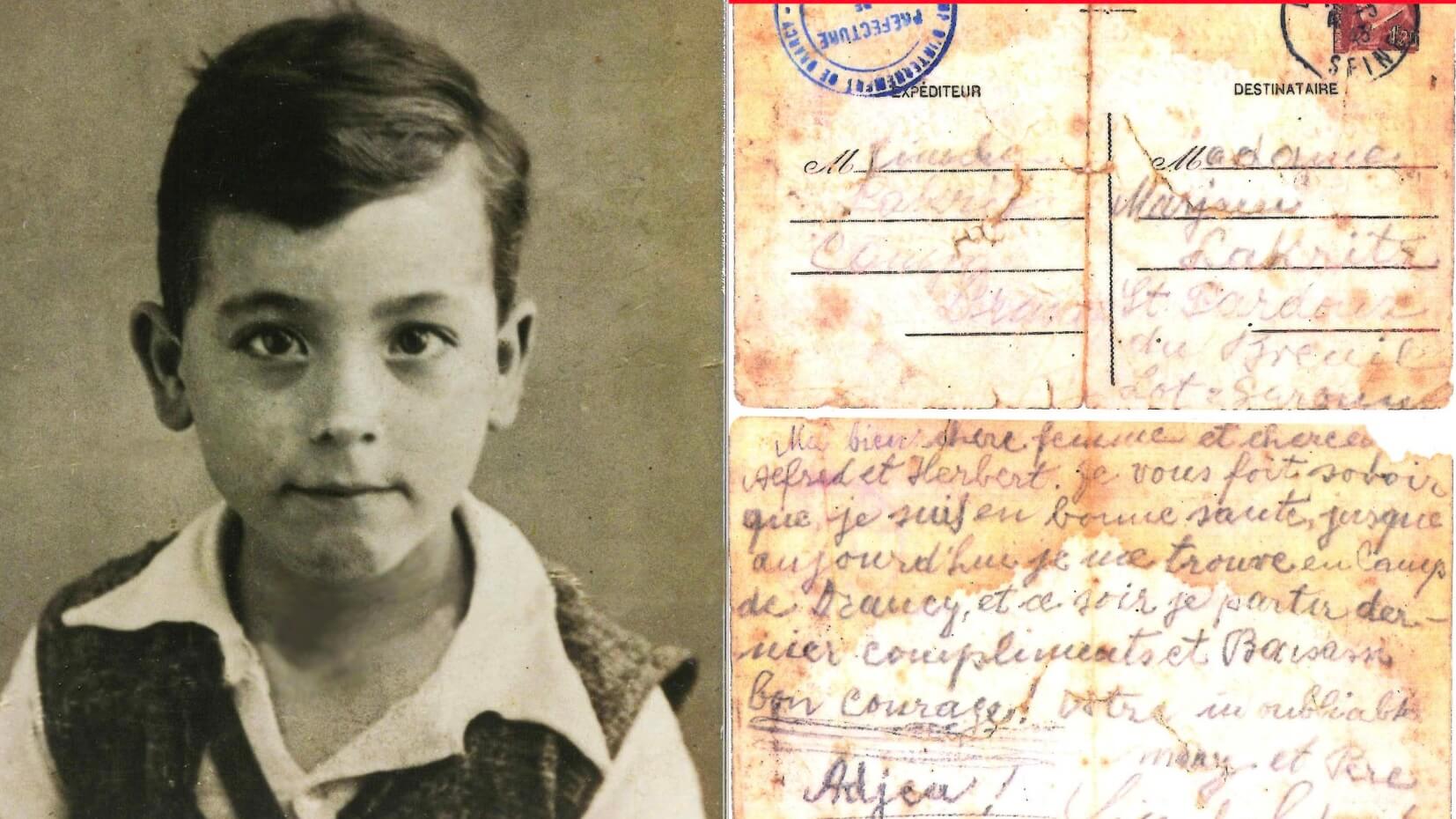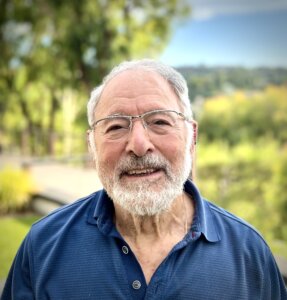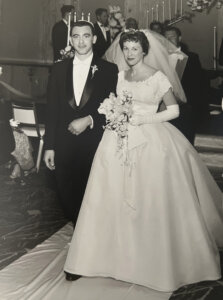This devastating story of a hidden child during WWII will change how you think about France and the Holocaust
In ‘Adieu,’ Alfred Lakritz tells the powerful story of his own survival

Alfred Lakritz wrote his memoir to serve as proof “that the Holocaust was real and that evil did take place.” Courtesy of Belmonte Press
Adieu: A Memoir of Holocaust Survival
By Alfred J. Lakritz
Belmonte Press, 250 pages, $25
Adieu: A Memoir of Holocaust Survival, by Alfred J. Lakritz, is the most detailed, well-researched, and moving account of life as a hidden child in France during the Holocaust that I have ever read. It is also an exploration of the aftermath of that experience, and an investigation into who helped and who collaborated, in small and large ways.
If you have ever wondered how, exactly, a child managed to elude the Nazis for two or three years — with addresses and precise details, and even photographs — this book will answer that question. It is also, in many ways, an intimate look at rural France, from hardy and resourceful farmers who risked their lives to hide Jews to people like Monsieur Georges Blancher, an elderly Christian neighbor who got Alfred started in stamp collecting after the war and was “almost like a substitute father.” It is unflinchingly honest and does not shy away from painful questions of life, death, responsibility, and response.
“He would explain to me what each stamp commemorated — what kings they portrayed, what battles, and so forth,” Lakritz writes of Monsieur Blancher. “In that way I learned a lot about French and European history. It was a way for me to acquire the knowledge that I might otherwise have received in school, which I had no interest in.” By this point, the reader knows that Lakritz lost the opportunity to go to school, along with so much else; and surely Monsieur Blancher must have had a sense of what his young Jewish neighbor went through, and why his real father was no longer around.
Lakritz opens his memoir by explaining that his family’s real surname was Weber. The Nazis forced his father, Simche Weber, to take on a different last name, which means “licorice”; this name, which makes the author wince, stuck with him to this day. Lakritz documents how and why this renaming happened, and it sets the tone for all that follows.
Lakritz is a lawyer by profession. He is 89 years old, and lives in California, and explains that one reason it took him so long to write this book is because he wanted to document everything. He knows that he is one of the lucky ones; yet he writes that sometimes what he must write is so painful that he cannot continue. In this era of increasing Holocaust denial, I share his hope that his exhaustive documentation of his incredible tale of survival will matter in the future.
“I have written this memoir as proof that the Holocaust was real and that evil did take place,” Lakritz writes, “but there were also righteous people who risked their lives to save innocent people like me. I want to convey that I am an ordinary man who suffered extraordinary losses at the hand of evil, for no sin other than the accident of my birth. I have lived a life that I have earned in order to prove that those who saved me did so with some reward, whether they asked for it or not.”
This is a complex narrative that would be challenging for any writer to present. At times I wished the book would have been shaped a bit differently, or perhaps that the author had more experience with literary writing; but the overwhelming impact of a first-hand account matters more, and I hope will matter deeply, in the years ahead.

The Webers, as they were then known, married in 1933 and lived in Kiel, Germany. They were devout Orthodox Jews who made repeated attempts to escape — to the U.S., which faltered due to a Nazi clerk’s cruelty, then to Belgium. “We were smuggled by paid persons into Belgium,” Lakritz writes. But that doesn’t work for long; they bolt to rural France.
“We were considered stateless people since we had no visa from Germany; we were not citizens of Belgium, and we had no official status in France. So as “illegals,” we were granted a temporary visa to stay in Marmande. Every 30 days my parents had to go to the police station to renew their temporary permits.”
There are many incredible twists and turns to this precarious life under the Vichy government, as the young parents turn to farming and sewing among farmers to survive, but in the end, the author’s brave father — who becomes the leader of the local Jewish resistance — is arrested, sent to Drancy, and then murdered in Majdanek. Lakritz exhaustively documents what happened to him there, including how little he ate and how he met his final fate. This is by far the hardest part of the book to read, and it includes photographs of prisoners at Majdanek.
Incredibly, Lakritz’s mother, with the steadfast help of local farmers who repeatedly hide her, survives. He and his younger brother go into hiding for weeks, then months, then years, as the Nazis hunt Jewish children, and move from place to place within France; miraculously, they make it. But “miraculously” really doesn’t cover it; Lakritz meticulously shows who helped and how they helped, and he does his absolute best to understand why.
This is a tale of churches, priests, sisters, and rural people whose deep faith made them help. It is also about a summer camp for Jewish children, long hikes for hidden children in the mountains of France when things got especially dangerous, and the constant move from place to place at a time when no place is safe. There are foster families of all kinds, and more new names. Alfred is given the surname LaCroix, or “the cross,” but he is not forced to convert. One of the most beautiful and haunting parts of Adieu is a retelling of a conversation the young Alfred had with a priest who was risking a great deal to shelter him. The priest does not force the boy to become Christian, but instead explains exactly what he needs to do for his own safety.
Decades later, Lakritz tries to understand why a particular order of nuns helped him. He connects with a Mother Superior who explains that the order protects the “most desperate,” which is what he and his brother were then. He returns to France and personally meets with the children of the family that sheltered his mother — they did such a great job that after liberation, a Jewish organization struggled to find her.

But even six decades later, there are hidden parts to the story. When Lakritz and his wife, Judy, return to France, they attend a lunch where villagers show up with some astonishing information. When Lakritz’s father was arrested and dragged away, he dropped his siddur (prayer book). But a local villager picked it up. That villager distributed pages of the siddur to locals, who kept a page each, and prayed for Lakritz’s father’s safety. They recognized the holiness of it, the concept of an object of faith. And 60 years later, some of these villagers showed up to lunch and brought individual pages of his father’s siddur to a now-grown Alfred Lakritz.
I cried when I saw the pages, which Lakritz photographs and shares with the reader. These are familiar pages to me, and I’m sure they are to Lakritz, but cut apart like that — and coming back into his life decades after his father’s murder — they are almost unbearable to absorb. Sim shalom, a prayer for peace. Another page, from the service for holidays, starts with chaim, or life. It’s haunting to see ata bachartanu michol ha’amim — You have chosen us among all the nations. “Chosen for what?” I can imagine Lakritz thinking.
Lakritz is honest about how his faith and religious practice changed after the war. His mother and brother observed the holidays, but the intensity of daily practice was not the same. The price had been too high. He tells of his experience of having a bar mitzvah just after the war, and of the kindly “older Jewish scholar named Dr. Landau” who traveled to teach him and his brother. There were a handful of guests for Alfred’s bar mitzvah, and by the time his brother reached 13, there were no guests. Yet he understands that his mother made the major effort to give him a bar mitzvah because it would have mattered to his father, and he knows that Dr. Landau was surely thinking of all the boys who would never have a bar mitzvah.
This is a very personal book that could only have been written by the author himself. He shows his own curiosity about his past, his own willingness to visit Kiel, while his brother does not want to go at all. He is also movingly honest about non-Holocaust topics — his first date with his wife, for instance, and the loss of a longtime friendship. He constantly addresses complexity head on, such as when he has a conversation with a villager who played a role in his father’s arrest. Later, that same man helped many Jews.
It’s impossible to read this book without acquiring a changed view of France. Many famous tourist spots — St. Tropez, for example — play a role here. So does Evian, site of a conference where representatives of 32 countries came in 1938 to discuss the fate of German-Jewish refugees, which later became a site of rescue.
Adieu gets its title from the last postcard Simche Lakritz, the author’s father, sent to his wife and sons. The postcard exhorts them to be courageous, and it ends with “Adieu.” In the French language, adieu means “goodbye.” It does not mean “farewell,” “see you soon,” or “until next time.” It does not carry the casual connotations of au revoir or the breeziness of bonne nuit. It is “goodbye.” Adieu means finality.
Throughout this book, Lakritz explains the role of language, parsing the difference between “Judenrein” — “cleansing the earth of all Jews” and “Judenfrei” — “freeing the earth of all Jews,” and tracing the evolution of his mother’s name from her childhood in Cologne, Germany, as Marjem Willner, to her attempts to survive in rural France, to her postwar life in Oakland, California, by which time she is known as “Mary.”
Lakritz has shown the deep effects of the Holocaust, down to the changed names — and changed lives, in a new language — that a bystander might never discern. He began life speaking German, then spent the rest of his childhood in French. When he and his brother finally reached safety in Oakland, California, where they had an uncle, and went to public high school, they never said a word about what they had seen. The brothers wanted to start anew, in English, so everything remained hidden. In a sense, they wanted to bid adieu to all they had seen and experienced, for reasons that will be entirely understandable to anyone who reads what happened to them. We are all fortunate that Lakritz gathered the strength to look back for us.

















